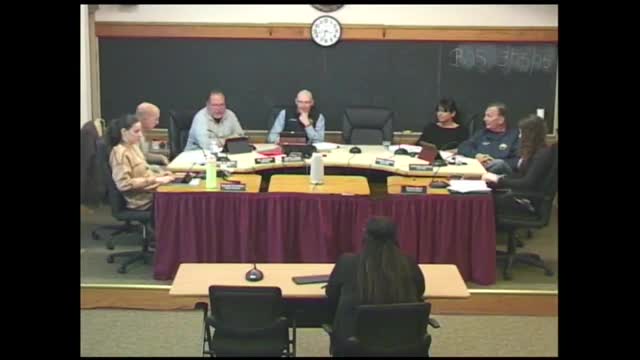Charlton reviews first annual comprehensive financial report; draft budget factors in fire station, landfill capping debt
Get AI-powered insights, summaries, and transcripts
Subscribe
Summary
Finance director presented the town's first Annual Comprehensive Financial Report for GFOA review; select board reviewed a draft FY26 budget that includes debt service for a fire station and a previously approved $2,000,000 landfill capping project.
Ashley Oberza, the town’s finance director and treasurer-accountant, presented Charlton’s first Annual Comprehensive Financial Report (ACFR) to the Select Board on March 25 and said the report has been submitted to the Government Finance Officers Association for consideration for a Certificate of Achievement in financial reporting.
The ACFR expands on the town’s previous GAAP-based audited financial statements, offering what Oberza described as a “much broader range of important financial information” designed to increase transparency for residents and lenders. “By preparing this comprehensive report, we become eligible for the GFOA certificate of achievement for excellence in financial reporting,” Oberza said.
The presentation set the stage for a discussion of the draft FY26 budget. Town Administrator Andrew Golos and finance staff reviewed the draft, which keeps general-government staffing at status quo while adding several public-safety positions the board previously prioritized. Golos said the draft includes an administrative sergeant and another emergency telecommunicator for public safety, and an EMS officer in the fire/EMS budget.
Board members and staff discussed several multi-year capital and debt items that are reflected in the draft budget. The Select Board previously approved a $2,000,000 borrowing authorization for landfill capping; Golos said the town received MassDEP approval to proceed with procurement and expects construction procurement to begin this summer, with much of the work carried out in fall and winter and final capping in spring–summer of next year. He said the project is expected to take about a year and a half once contracts are executed.
Golos and Oberza described the draft debt-service increases as tied primarily to early borrowing for the fire station (referred to in meeting materials as the substation) and the landfill cap. During the presentation staff referenced interest and debt-service amounts in the draft—Oberza and Golos cited roughly "one hundred and thirty" (thousand) related to the substation interest and roughly "seventy thousand" for landfill-related interest in the draft figures, and they said some debt service also anticipates the fire engine purchase if it passes at Town Meeting. The transcript does not specify precise line-item authorizations or final borrowing amounts beyond the previously approved $2,000,000 landfill authorization.
Board members and staff also discussed other finance items in the ACFR and budget. Oberza said the ACFR submission deadline was January 31 for the current year and will shift to December 31 in future years; she said the town expects to hear back from the GFOA in six to nine months. The board and staff noted recent positive comments from S&P and the town’s financial advisor about the town’s practice of prefunding liabilities.
A board member raised concern about funding the town’s OPEB (other post-employment benefits) liability; Golos said current estimates put full funding in the 10- to 12-year range, but that actuarial changes or state policy shifts could alter that timeline. Oberza and Golos recommended continued monitoring and potentially increasing annual contributions.
Board members also noted the town’s ARPA (American Rescue Plan Act) funds are largely allocated and being drawn down, with the largest remaining pool identified for radio-system improvements; Oberza said allocations were completed last year and projects must be spent by the end of the calendar year.
The Select Board and finance staff emphasized health-insurance cost pressures—the draft budget includes a projected 19% increase in health-care costs—and noted the school budget remains the town’s largest expenditure, estimated in discussion at roughly 47–50 percent of the operating budget (the transcript offers that range rather than a single definitive percentage). Staff said they intend to post the ACFR on the town website and share it with the finance committee for more detailed review.
No formal votes on borrowing or budget adoption occurred at the March 25 meeting; the board treated the draft budget as a preliminary review and referred the draft to the finance committee for further work.
